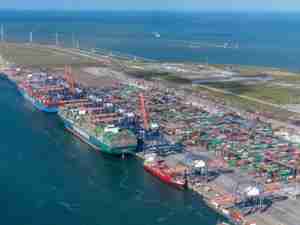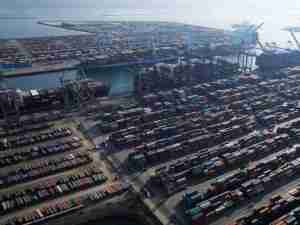“The Port of Boston saw an increase in container volume from our direct call steamship lines, which is more than 90% of our business,” said Mike Leone, Port Director for Massport. “It is the most reliable and cost-effective way for trade-dependent companies to compete in the global marketplace.”
Direct call TEUs grew to roughly 193,000 while total TEUs at Conley Terminal in 2008 was approximately 209,000. Direct call growth was the result of an increase in the amount of cargo handled by Mediterranean Shipping Company (MSC); and China Ocean Shipping Company (COSCO) and its vessel-sharing partners “K” Line, Yang Ming Line, and Hanjin Shipping. The overall decline can be attributed to the termination two services and decreased volumes on the barge service between New York and Boston.
On October 15, 2008, Boston became the first major US port to implement the Congressionally-mandated Transportation Worker Identification Card (TWIC) program. The program requires all port workers to possess this biometric identity card to gain unescorted access to port facilities. Massport embarked on a year-long effort with several federal agencies to educate all stakeholders about TWIC. And as a result of the successful implementation, many port authorities now implementing TWIC looked to Massport for guidance.
Conley Terminal significantly improved its efficiency in part from nearly a $30 million upgrade completed in 2007, and the redesign of the terminal’s main entrance gate completed in the fall of 2008. The new gate configuration extends the queuing line much further into the terminal getting trucks off nearby residential streets. Truck turn-times at Conley Terminal improved significantly in 2008, averaging 32 minutes as compared to 39 minutes in 2007. A new problem resolutions office was also created near the entrance to provide immediate solutions to those truckers with incorrect shipping documents, or to those who may have a problem getting onto the terminal, because they don’t possess the new TWIC.
The Port of Boston’s vessel and cargo activity support 34,000 jobs, and contributes more than $2 billion to the local, regional, and national economies through direct, indirect, and induced impact.
The Port of Boston is the oldest continually active major port in the Western Hemisphere and is the largest port serving New England. Top imports include: alcoholic beverages, frozen seafood, footwear and furniture. Top exports include: hides and skins, autos, logs and lumber, frozen seafood, paper including waste paper, and scrap metal.










